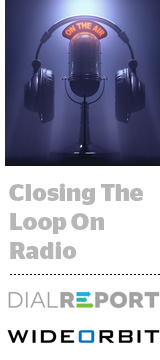
As media becomes more measurable, buyers are demanding tangible business results across every channel.
Terrestrial radio is no exception.
That’s why on Wednesday, radio attribution platform Dial Report joined forces with broadcast trafficking and sales platform WideOrbit to enhance its closed-loop attribution system for broadcast radio.
“The collaboration with WideOrbit is making our data better,” said Paul Brenner, president at TagStation, which owns Dial Report as well as NextRadio, an app that lets users listen to terrestrial radio through an AM/FM receiver chip in their smartphone. “We’re trying to get comprehensive reporting across the industry.”
TagStation launched Dial Report last year to offer buyers better attribution by stitching first-party data from 300,000 NextRadio listeners with broadcast radio exposures and tying that back to store visits, sales lift and other metrics.
WideOrbit, used by major broadcasters such as Cumulus Media and Entercom, will bring more granular data into Dial Report’s system via API, such as when a spot aired and the specific creative version used for each station. Previously, buyers would have to wait 30 to 90 days to receive an invoice that showed whether their spots aired at all.
“This allows them to see it in a much timelier manner and put radio on par with digital solutions, so we can better compete and win those dollars,” said Susie Hedrick, SVP of sales at WideOrbit.
Since radio stations use fragmented systems to manage their campaigns, they classify data about their audio content differently. Dial Report takes that data into a cloud-based system that cleans and aggregates it for standardized reporting and measurement.
“There are a lot of different systems being used at radio groups across the country,” Hedrick said. “Viewing the results of an entire campaign has been difficult, because they’re working with different technologies.”
WideOrbit and Dial Report have been working on the integration for about six months. While broadcasters using WideOrbit’s platform haven’t turned on the integration yet, Hedrick anticipates most will be interested, given advertiser demands for more granular metrics.
“We are doing this at the request of many customers who are interested in proving the value of radio advertising in a more concrete way,” she said.
Robert Enright, president at media buying agency The Ward Group, began using Dial Report’s attribution platform when it launched last year. The platform is popular with buyers who have shifted budget back to traditional channels as they max out their scale on digital, he said.
One retail client, for example, tested Dial Report to find that audiences exposed to its radio ads were three times more likely to visit a store during the duration of the campaign. The platform is easy to set up and requires minimal training for broadcast buyers, because Dial Report does much of the attribution work in-house.
“Tools like this have created a new layer of attribution for broadcast channels that didn’t exist before,” Enright said. “It’s something that much of the industry is hungry for.”
This post was syndicated from Ad Exchanger.


More Stories
Marketing Morsels: Hidden Valley Ranch, La-Z-Boy, Topps & More
Flashback: Jane Pauley and Deborah Norville Revisit Today’s 1989 Succession Drama
Ally Financial Revives ‘Banksgiving’ With A TikTok Twist